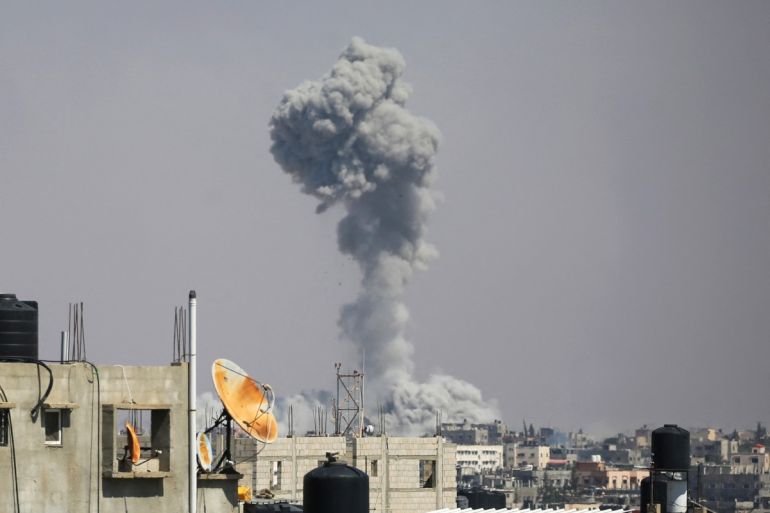Give or take a few bombs, US complicity in genocide remains ‘ironclad’
Biden administration’s decision to hold up delivery of 3,500 bombs hardly constitutes a betrayal of the Israeli killing machine.

On Wednesday, May 8, United States Defense Secretary Lloyd Austin became the first senior administration official to publicly confirm that the US government has uncharacteristically paused a weapons shipment to Israel. Over the past seven months, the Israeli military has killed some 35,000 Palestinians in the Gaza Strip with solid US backing.
Speaking at a Senate subcommittee hearing, Secretary Austin remarked that the pause takes place “in the context of unfolding events in Rafah”, the city in southern Gaza where an estimated 1.4 million Palestinians, including more than 600,000 children, are currently sheltering. The majority of these people were forced to flee to Rafah from other parts of Gaza, in keeping with Israel’s modus operandi of making Palestinians refugees over and over again.
Keep reading
list of 4 itemsIsraeli army steps up attacks across Gaza as top US official visits Israel
Gantz threatens to quit Israeli gov’t if no post-war Gaza plan
Malaysian PM: Can’t deny US complicity in Gaza genocide
And while Rafah has hardly been spared the terror and slaughter that have characterised the past seven months of Israeli operations in the coastal enclave as a whole, the threat of a full-scale assault on a mass of trapped civilians in the city has made even the global superpower – Israel’s devoted BFF – a bit squeamish.
To that end, news reports began emerging over the weekend that the Joe Biden administration had undertaken to suspend a shipment to Israel of munitions that might be used in a Rafah offensive. The shipment was said to consist of 3,500 bombs, of which 1,800 were of the 2,000-pound (907kg) variety and 1,700 were in the 500-pound (227kg) category.
Certain other weapons transfers to Israel were also said to be under review.
Of course, given that the US has been actively abetting genocide and famine in Gaza for well over half a year with all manner of munitions and money, it’s not exactly clear why the case of Rafah should suddenly elicit such imperial concern. But, hey, it’s potentially good PR.
Prior to Secretary Austin’s remarks on Wednesday, US officials had been noncommittal about the reports of a suspended weapons shipment. In a May 6 news briefing, for example, National Security Communications Advisor John Kirby flat-out refused to confirm whether or not the reports were correct, instead announcing: “All I can tell you is that … our support for Israel’s security remains ironclad. And I’m not going to get into the specifics of – of one shipment over another.”
Indeed, it appears that “ironclad” is the US political establishment’s new favourite word when it comes to describing support for Israel – which means that, at the end of the day, Israel’s habit of massacring Palestinians will always be defended over the right of Palestinians to not be massacred.
Meanwhile, Kirby’s comment about “one shipment over another” is telling, to say the least. After all, there are a whole lot of US weapons shipments to Israel – and holding up delivery of 3,500 bombs hardly constitutes a betrayal of the Israeli killing machine, as some more dramatic members of the US right wing have chosen to portray it.
For starters, Secretary Austin emphasised during his Senate subcommittee appearance that the paused weapons shipment will not affect the $26bn in supplemental aid to Israel that the US Congress approved in April. This is on top of the various billions of dollars already provided annually to Israel by the US – most of which money, the Council on Foreign Relations notes, “is provided as grants under the Foreign Military Financing (FMF) program, funds that Israel must use to purchase U.S. military equipment and services”.
Nor will the suspension impact the additional $827m worth of military goodies that the Biden administration has just authorised for Israel.
In other words, it is mostly business as usual – kind of the equivalent of giving somebody hundreds of dollars on a daily basis and then making a show of withholding five cents.
According to the US Conventional Arms Transfer Policy, the US government is obligated to “prevent … arms transfers that risk facilitating or otherwise contributing to violations of human rights or international humanitarian law”. And yet, what is US foreign policy itself if not one big violation of all of that?
Even prior to the 2001 launch of the massive global violation known as the “War on Terror”, the US had already spent decades enabling mass bloodshed from Latin America to the Middle East and beyond. In the particular case of Israel, consistent US support for the wanton violation of human rights and international humanitarian law in Palestine and Lebanon makes you wonder why anyone ever bothered writing up a Conventional Arms Transfer Policy in the first place.
Now Secretary Austin, too, has reaffirmed the United States’ “ironclad” commitment to Israel even in the face of the paused munitions shipment – which just goes to underscore the largely cosmetic nature of the move, and the perceived need to project some degree of humanitarian awareness and concern.
Biden himself also chimed in on Wednesday with a warning that he will not be supplying offensive weapons to Israel in the event of an all-out assault on Rafah, noting that “civilians have been killed in Gaza as a consequence of those bombs”.
Well, yeah.
Genocide is genocide. And give or take a few thousand bombs, US complicity in that genocide is totally ironclad.
The views expressed in this article are the author’s own and do not necessarily reflect Al Jazeera’s editorial stance.
